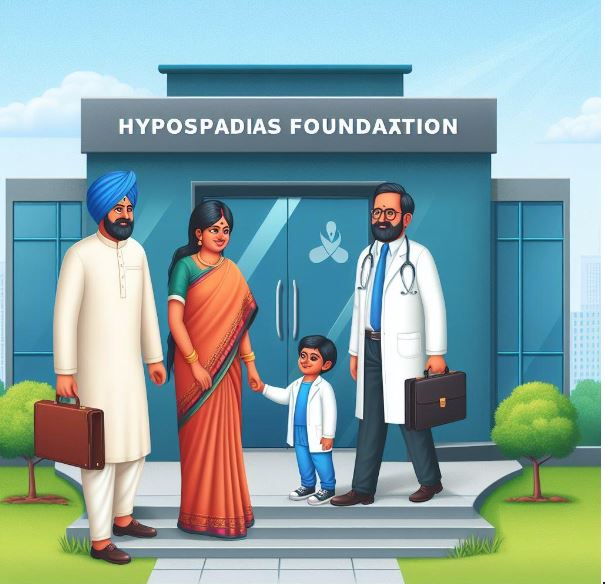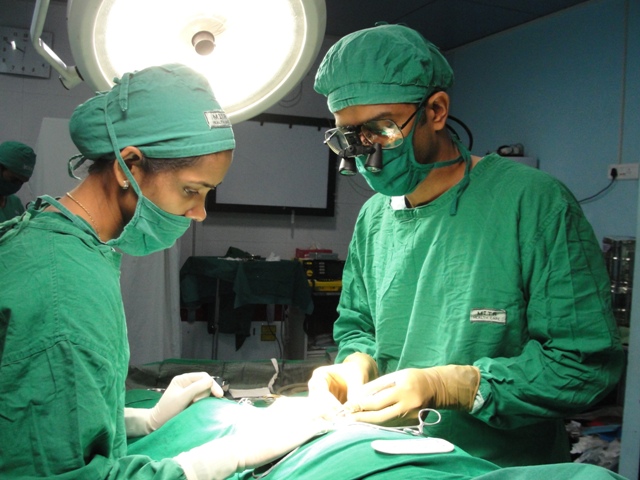Successful hypospadias surgery is a corrective procedure that aims to create a urinary passage with opening at the tip of the penis. The final cosmetic result is such that the child or adult can pass urine in a single straight stream without any pain or discomfort. Any curvature of the penis (chordee) is also corrected during the hypospadias surgery, and this is important for future sexual function.

Most boys who undergo hypospadias repair in early childhood before 5 years have minimal recollection of hospital stay and surgery. The repairs are typically durable and hold up well throughout puberty and adulthood. The success rates vary depending on the severity of the condition, but most studies report a success rate of over 90% for distal hypospadias (mild cases) and 80% for more proximal cases. At hypospadias foundation, we are dedicated in treating children and adults with hypospadias for last 15 years, hence our success rates are more than 95% for mild, severe and redo hypospadias in children and in adults making us a leading centre for hypospadias repair in India and worldwide. Here are some factors that contribute to a successful hypospadias surgery:
- Surgeon’s experience : Hypospadias surgery is a specialized procedure, and the success rate is higher when surgery is performed by a surgeon who has experience with this type of surgery. A skilled surgeon with experience in hypospadias repair can create a more natural-looking penis, which can boost your child’s confidence and self-esteem in the long run. Hence a surgeon who performs more than 50 surgeries per year has better success compared to centres which perform only very few per year. At hypospadias foundation we currently perform almost 250 hypospadias correction surgeries every year.
- Severity of hypospadias: Generally, milder forms of hypospadias have a higher success rate than more severe forms. Severe hypospadias is usually associated with moderate to severe chordee and mostly needs a staged repair. The risk of complications is also higher in severe hypospadias.
- Age at surgery: Hypospadias surgery is typically performed between 6 to 18 months of age or between 3-5 years of age. The results after hypospadias surgeries are excellent in childhood and it also ensures proper development of the penis. Surgery in adulthood is associated with slow healing due to decreased collagen production and decreased cell turnover with age which in turn leads to higher risk of complications. Rate of infections and breakdown is also more in adult hypospadias repairs.
- General health of the child: We routinely check hemoglobin, overall growth & wellness of the child, urine for any infection before surgery. Children who are underweight, not growing well, have added anomalies or feeding issues, have higher rates of complications.
During and following hypospadias repair surgery, there are several things that can be done to improve the chances of a successful outcome :
During the surgery :
- Choosing the right technique: There are several different surgical techniques used to repair hypospadias. The best technique for a particular child or adult will depend on the severity of the hypospadias and the surgeon’s experience. A hypospadias surgeon should choose the best technique after considering all the factors during the surgery. With more experience, a skilled surgeon can choose a technique which will give good results in a particular case. Experience allows surgeons to anticipate potential problems during surgery and adapt their approach accordingly. They can recognize anatomical variations and make real-time decisions to avoid complications.
- Tissue handling: Most of the good results in hypospadias surgeries are attributed to use of right instruments, technique and how gently the surgeon handles the tissues. A skilled surgeon handling a hypospadias surgery translates to better handling of tissues, minimizing blood loss, and precise suturing, all reducing potential complications.
- Minimizing the duration of surgery: The longer the duration of surgery the higher the risk of tissue edema and impaired healing. The tourniquet is tied at the base of the penis for some steps to avoid bleeding during the surgery. If the tourniquet time is longer than 30 minutes, then there may be risk of tissue injury and healing may be slower in these cases.
- Breathable dressing after surgery: Tight compression dressing can cause pressure on the new urinary passage hence light dressing is advised after hypospadias surgery.
- Preventing infection: All aseptic technique and precautions should be followed during the surgery to prevent surgical site infection. Also, a pre-surgery antibiotic should be given to prevent infections.
After surgery :
- Dressing care: Hypospadias dressing can get soiled with stools after surgery. Whenever hypospadias dressing gets dirty it must be changed. Soiled dressing is a nidus for infection. Parents must be strictly instructed to keep a close watch and report to the hospital in case of soiled dressing.
- Identifying infection at early stages: Fever with foul smelling dressing or pus discharge from within the dressing are signs of wound infection. When present, the dressing must be changed immediately along with administration of intravenous antibiotics to control the infection.
- Using prescribed medications as directed: Your doctor will prescribe medicines such as oral antibiotics, analgesics, anti spasmodics, multivitamins etc which will prevent infection at the operated site, give relief from post operative pain and help in healing.
- Wound care after dressing and catheter removal: After dressing and catheter removal, hot water bath is advised three times a day. Local antibiotic ointment is applied at the operated site to facilitate healing. Failing to follow these may lead to infection at the operated site, in turn affecting the surgical results.
- Feeding & general health: Make sure that the child is taking a nutritious diet, is pain free and happy in the recovery phase. Junk food should be avoided. Constipation should also be prevented by good hydration, fibre rich foods and if need be laxative syrups.
Experienced surgeons would have likely encountered various complications of hypospadias before. This knowledge allows them to identify early warning signs and take corrective measures swiftly, minimizing the severity of complications.
If you are considering hypospadias surgery for your child, it is important to discuss the risks and benefits with a hypospadias specialist. Best hypospadias surgeon is the one who has abundant experience in this field and have likely interacted with many families dealing with hypospadias. This experience allows him/ her to communicate complex medical information clearly and answer your questions patiently, easing your anxieties. An experienced surgeon doesn’t guarantee zero complications, but using proper protocols significantly reduces the risk. Open communication is the key. Discuss your concerns about complications with the surgeon and ask questions openly. By finding a skilled and experienced hypospadias surgeon and openly discussing potential complications, you can ensure best outcome for your child’s hypospadias surgery.
If you are looking for a centre with excellence in hypospadias and dedicated in hypospadias treatment and care, then hypospadias foundation at Kharghar, Navi Mumbai would be one of the choices. We at hypospadias foundation specialize in hypospadias surgery, including complex and redo cases. We recognise the emotional impact of hypospadias and offer counselling support for families. If your child or someone you know is suffering from hypospadias, then do write to us or visit us so that we can help you get the best hypospadias treatment.
Contacting the Hypospadias Foundation:
- Website: https://www.hypospadiasfoundation.com/
- Email: hypospadiasfoundationindia@gmail.com
- Phone:
- +916262840940
- +916262690790
- +919324180553( whatsapp and teleconsult )
Fill up contact form: https://www.hypospadiasfoundation.com/contact/
People also search for these terms
Pediatric hypospadias surgeon, adult hypospadias surgeon, Successful hypospadias surgery, experienced hypospadias surgeon, skilled hypospadias surgeon, hypospadias surgeon with high success rate India, success rate of hypospadias surgery, best hypospadias centre, best hypospadias centre India, best hypospadias surgeon India, Hospitals for hypospadias surgery with best outcomes
Contact Form for Hypospadias Foundation
Please fill all clinical details and upload pictures and clinical summaries (if available)



